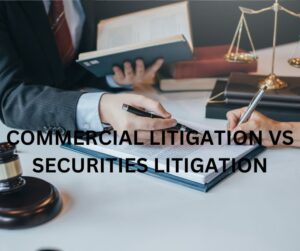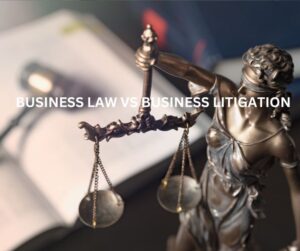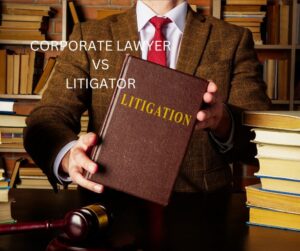In the dynamic landscape of Houston’s business environment, legal disputes are not uncommon. Whether it’s a startup in the tech industry or an established corporation in the energy sector, legal challenges can arise, potentially impacting a company’s operations, reputation, and bottom line.
This is where the expertise of a business litigation lawyer becomes invaluable. Specializing in resolving disputes through legal proceedings, these lawyers serve as navigators in the complex world of business law, ensuring that your business interests are protected and advocated for effectively. Understanding the role of a business litigation lawyer in Houston and recognizing when to seek their assistance can be crucial for any business aiming to thrive in this competitive market. Call our office to speak to an attorney about your business dispute.
Understanding Business Litigation in Houston

In Houston, a city known for its diverse economic base and vibrant business scene, the nature of these disputes can be as varied as the industries present in the region. What sets Houston apart is not just the volume of business activities but also the specific legal frameworks and business norms that influence how disputes are approached and resolved.
When considering the local legal landscape, businesses must recognize the importance of engaging with a lawyer who is not only versed in business litigation but also deeply familiar with Houston’s legal environment. This local expertise is crucial in navigating the nuances of state and local laws that could impact the outcome of a dispute.
For businesses facing potential legal challenges, the first step is to understand the signs that may indicate the need for a litigation lawyer. These could include contract disputes, issues with business partners, or challenges to your intellectual property rights. Recognizing these signs early and consulting with a lawyer can help prevent minor disputes from escalating into major legal battles.
The Expertise of a Houston Business Litigation Attorney
A business litigation lawyer in Houston should bring a combination of legal acumen, local knowledge, and practical business insight to the table. These professionals are not just lawyers but strategic partners who understand the complexities of business operations and the legal challenges that can arise. Their expertise extends beyond general legal knowledge, encompassing a deep understanding of business structures, contract law, and the specific legal issues prevalent in Houston’s business sectors.
An adept business litigation lawyer will guide you through the litigation process, from the initial case evaluation and strategy development to negotiations, trial preparation, and court representation. They employ a tactical approach to litigation, assessing the risks and benefits of various legal strategies to ensure that the chosen path aligns with the business’s objectives and long-term interests.
For business owners, understanding your legal standing and potential vulnerabilities is essential. This might involve conducting a legal audit of your business operations, contracts, and agreements to identify areas where you might be at risk of legal disputes. By being proactive and informed, you can engage with a litigation lawyer from a position of strength, ready to tackle any legal challenges head-on.
Commercial Litigation vs Securities Litigation

Common Legal Disputes Faced by Houston Businesses
Houston’s diverse economic landscape presents a variety of legal challenges for businesses. Common disputes include breaches of contract, where one party fails to fulfill their obligations under a contract, leading to potential legal action. Partnership disputes are another frequent issue, where disagreements among business partners regarding the direction, management, or financial decisions of the company necessitate legal intervention.
Intellectual property disputes are also prevalent, especially in industries driving innovation, where protecting patents, trademarks, or trade secrets is crucial. Real estate disputes, employment law issues, and compliance violations are other areas where businesses may find themselves in need of a litigation lawyer’s expertise.
For business owners, understanding these common disputes can help in identifying potential legal risks within their own operations. Regularly reviewing contracts, partnership agreements, and compliance protocols can help in preemptively identifying areas of concern and addressing them before they escalate into more significant legal challenges.
Choosing the Right Business Litigation Lawyer in Houston
Selecting the appropriate business litigation lawyer is a critical decision that can significantly influence the outcome of your legal issues. It’s essential to choose a lawyer with a strong track record in business litigation, possessing not only the legal expertise but also a deep understanding of the Houston business environment and its specific challenges.
Look for an attorney who communicates clearly, listens to your concerns, and aligns with your business’s goals and values. The right lawyer should be a strategic partner, offering not just legal representation but also advice and insights that contribute to your business’s overall strategy and success.
To choose the right lawyer, start by researching and creating a shortlist of potential candidates, then conduct interviews or consultations to assess their experience, approach, and compatibility with your business needs. This due diligence will ensure that you partner with a lawyer who is well-equipped to represent your interests and guide you through the complexities of business litigation.
Working with Your Houston Business Litigation Lawyer
Once you’ve selected a business litigation lawyer, establishing a strong working relationship is crucial for effective legal representation. This collaboration begins with an initial consultation, where you’ll discuss the specifics of your case, outline your objectives, and develop a preliminary strategy.
Effective communication is key to this partnership. Be prepared to provide your lawyer with all necessary documentation and information related to your case. Transparency and honesty about your business operations, history, and goals will enable your lawyer to offer the most effective representation.
Throughout the litigation process, stay engaged and informed. Your lawyer should keep you updated on developments, offering explanations and guidance on strategic decisions. This collaborative approach will ensure that the legal strategy aligns with your business’s objectives and positions you for a favorable outcome.
The Difference Between Business Law and Business Litigation

Business Law Defined
Business law, also known as commercial law, encompasses the set of legal rules and regulations that govern the formation, operation, and regulation of businesses. It covers a wide range of legal disciplines including:
- Corporate Governance: How companies are structured and managed, including the duties and responsibilities of directors and officers.
- Contracts: The drafting, reviewing, and negotiation of agreements that businesses enter into with other entities or individuals.
- Employment Law: Governing the relationship between employers and employees, including wage laws, workplace safety, and discrimination laws.
- Intellectual Property: Protecting the rights of businesses to their inventions, brands, and proprietary information.
- Real Estate: Involving lease, purchase, sale, and use of property.
- Regulatory Compliance: Ensuring that businesses comply with local, state, and federal regulations.
Business law is largely preventive; it involves advising companies on how to comply with laws and regulations, helping them to negotiate and structure transactions, and ensuring that their operations do not run afoul of legal requirements.
Business Litigation Defined
Business litigation refers to the practice of law that involves resolving disputes through formal legal proceedings. It is essentially the process of taking a business dispute to court or handling it through other judicial processes such as arbitration or mediation. Business litigation can involve a wide variety of issues arising from business operations, including:
- Contract Disputes: Such as breaches of contract.
- Partnership and Shareholder Disputes: Including conflicts over business management and profit sharing.
- Product Liability: Where businesses face lawsuits from customers over product issues.
- Employment Disputes: Involving claims such as wrongful termination or discrimination.
- Tortious Interference With Contract: A business litigation might even be called in to handle disputes caused by a third party, like tortious interference with contract.
Business litigation is reactive, focusing on resolving problems after they have occurred. It involves the application of legal principles in court or other legal settings to resolve disputes that have escalated beyond preventive measures.
Major Difference Between Business Litigation and Business Law
The key difference between business law and business litigation is that business law is focused on the creation, protection, and maintenance of a business’s legal framework and is more proactive. In contrast, business litigation deals with disputes related to this framework and is reactive, involving the resolution of conflicts through legal channels.
Do I Need a Corporate Lawyer, or a Litigator?

Corporate Lawyers Defined
Corporate lawyers, also known as transactional lawyers, focus on advising businesses on a wide variety of legal matters that pertain to the business’s operations. Their work primarily involves:
- Drafting and Reviewing Contracts: Creating and evaluating agreements related to various aspects of business operations, such as sales contracts, lease agreements, and service contracts.
- Corporate Governance: Advising on the legal aspects of running a corporation, including compliance with corporate governance standards and regulations, and assisting with board meetings and shareholder communications.
- Mergers and Acquisitions: Assisting businesses in acquiring other companies or merging with them, which includes conducting due diligence, negotiating terms, and drafting the necessary documents.
- Regulatory Compliance: Ensuring that the business complies with all relevant laws and regulations, which can vary widely depending on the industry.
- Business Formation and Structure: Advising on the legal implications of various business structures and helping with the formation of new business entities.
Corporate lawyers are typically involved in the day-to-day legal matters that keep a business running smoothly. They work proactively to help businesses avoid legal issues before they arise.
Litigators Defined
Litigators, or trial lawyers, represent clients in legal disputes, often in court. They become involved when disputes over contracts, compliance, or other business matters escalate beyond internal resolution. Their primary responsibilities include:
- Representation in Court: Arguing on behalf of their client in court, presenting evidence, and making legal arguments to judges and juries.
- Pre-Trial Procedures: Engaging in discovery, the process of exchanging information relevant to the dispute with the opposing party, and filing motions to advance or defend their client’s position.
- Negotiation and Settlement: Attempting to resolve disputes out of court through negotiation with opposing parties, which can often result in settlement agreements.
- Arbitration and Mediation: Representing clients in alternative dispute resolution procedures when appropriate, which can provide a less formal setting than a courtroom trial.
Litigators are reactive, stepping in when a legal issue has escalated to the point where formal dispute resolution is necessary. They are skilled in advocacy and negotiation, with a deep understanding of procedural law.
The Primary Difference Between Corporate Lawyers and Litigators
In summary, the primary difference between corporate lawyers and litigators lies in the nature of their work: corporate lawyers focus on transactional work that involves advising businesses on legal operations, regulatory compliance, and contracts, working to prevent legal issues. Litigators, on the other hand, handle disputes once they have escalated to formal proceedings or litigation, working to resolve these issues through the legal system. Both roles are crucial to the legal landscape, but they require different skills and mindsets due to their distinct focuses.
How To Prepare for Business Litigation
Navigating the complexities of business litigation in Houston requires the expertise of a skilled business litigation lawyer. By understanding the nature of business disputes in the region, recognizing when legal assistance is needed, and choosing the right lawyer, businesses can effectively address legal challenges and protect their interests. A strategic partnership with a knowledgeable attorney will not only aid in resolving current disputes but also strengthen the business’s legal footing for the future.
Business and Commercial Litigation Attorneys Near Me
For Houston businesses facing legal uncertainties or embroiled in disputes, now is the time to take proactive steps. Assess your legal situation, consult with a business litigation lawyer, and begin crafting a strategy that safeguards your business’s interests and future. Your legal journey is a critical component of your business’s success story, and with the right legal partner, you can navigate it with confidence and strategic insight.
